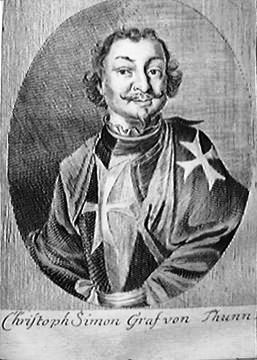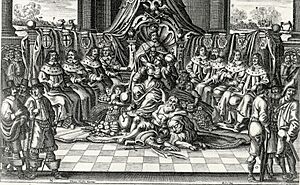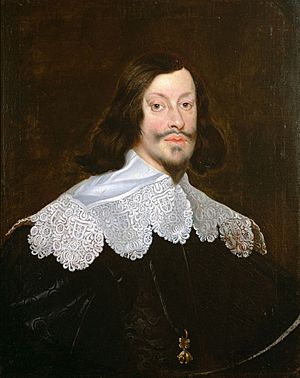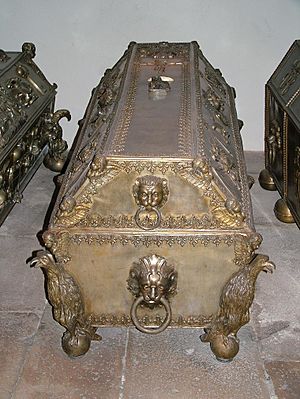Ferdinand III, Holy Roman Emperor facts for kids
Quick facts for kids Ferdinand III |
|||||
|---|---|---|---|---|---|
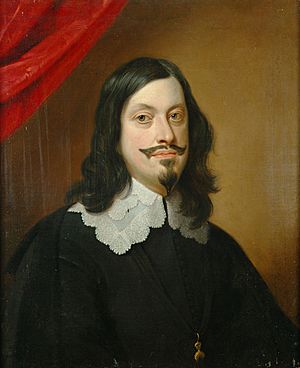
Portrait by Jan van den Hoecke (1643)
|
|||||
| Holy Roman Emperor (more...) | |||||
| Reign | 18 November 1637 – 2 April 1657 | ||||
| Proclamation | 18 November 1637 | ||||
| Predecessor | Ferdinand II | ||||
| Successor | Leopold I | ||||
| Born | 13 July 1608 Graz, Styria |
||||
| Died | 2 April 1657 (aged 48) Vienna, Austria |
||||
| Burial | Imperial Crypt | ||||
| Spouse |
Maria Leopoldine of Austria
(m. 1648; died 1649) |
||||
| Issue |
|
||||
|
|||||
| House | Habsburg | ||||
| Father | Ferdinand II, Holy Roman Emperor | ||||
| Mother | Maria Anna of Bavaria | ||||
| Religion | Roman Catholicism | ||||
| Signature | |||||
Ferdinand III (born Ferdinand Ernst, 13 July 1608 – 2 April 1657) was a powerful ruler from the House of Habsburg. He was born in Graz and died in Vienna. He became the Archduke of Austria in 1621. Later, he was crowned King of Hungary in 1625 and King of Bohemia in 1627.
From 1637 until his death in 1657, Ferdinand III was the Holy Roman Emperor. He took the throne during the final part of the Thirty Years' War. He tried to end the long and terrible war quickly. He also wanted to move away from some of his father's strict ideas about ruling.
The war had caused a lot of damage and weakened the empire. Ferdinand had to change his family's usual ways of doing things. This led to the important Peace of Westphalia, which finally ended the war. Even though his power over some princes became weaker, he remained strong in Bohemia, Hungary, and Austria.
Ferdinand III was also known for his love of music. He was the first Habsburg ruler to be recognized as a musical composer.
Contents
Ferdinand III's Life and Reign
Early Years and Education
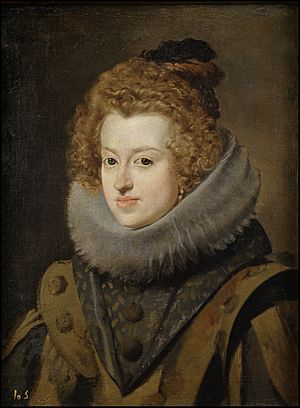
Ferdinand was born in Graz. He was the third son of Ferdinand II, Holy Roman Emperor and Maria Anna of Bavaria. He grew up in Carinthia and had a close relationship with his family.
He received a good education from Jesuits. He also learned about military matters from Christoph Simon von Thun. Ferdinand was said to speak several languages. After his older brothers passed away, he became the chosen successor to his father. He was carefully prepared to become the next ruler. Like his father, he was a very religious Catholic.
In 1621, Ferdinand became Archduke of Austria. He was crowned King of Hungary in 1625 and King of Bohemia in 1627. He made his power stronger in Bohemia. He created a new law that meant only the king could raise soldiers. This took away that power from the local nobles.
His father tried to get him elected as the Roman King in 1630, but it didn't happen. Ferdinand later joined those who opposed the powerful general Albrecht von Wallenstein. He was involved in Wallenstein's removal from power in 1634.
In 1631, Ferdinand married his cousin, Maria Anna of Spain. Their wedding was a grand event, lasting over a year. They had six children, including his future successors, Ferdinand IV, King of the Romans and Leopold I, Holy Roman Emperor. Maria Anna was intelligent and had a strong influence on Ferdinand. She helped connect the Habsburg courts in Madrid, Brussels, and Vienna during the war.
Leading the Imperial Army
After Wallenstein was removed, Ferdinand III personally took charge of the Imperial army in May 1634. He was supported by his generals.
He achieved his first big military successes in July 1634. He recaptured the city of Regensburg from the Swedes. In August 1634, he also took back Donauwörth. In September 1634, he won a major victory at the Battle of Nördlingen. This was a joint effort with Spanish forces.
Because of this victory, the Swedes lost control of Southern Germany. They had to retreat north. Ferdinand's influence grew, even though his direct role in the battle was small. He also gained more power after the fall of a powerful minister, Hans Ulrich von Eggenberg.
In 1635, Ferdinand helped negotiate the Peace of Prague. He tried to convince the German princes to join forces in the war. He also pushed for Protestant states to be included in the peace talks. Even after stepping down as commander, Ferdinand remained interested in military strategies.
Ruling During Wartime
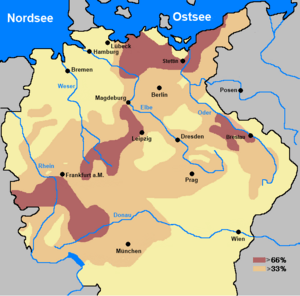
Ferdinand III was elected King of the Romans in December 1636. When his father died in February 1637, Ferdinand became Emperor. His main political advisor was Maximilian von und zu Trauttmansdorff.
By the time Ferdinand became Emperor, the empire was in a terrible state. Two decades of war had destroyed huge areas. Many people had died, were poor, sick, or homeless. Ferdinand did not want to continue the war. However, the war's momentum and political issues made it hard to end quickly. Hopes for early peace with France and Sweden did not come true.
When France joined the war in 1635, the fighting got worse. After some early successes, the Emperor's military situation became difficult. The Swedes won a victory at Wittstock in 1636. They threatened Ferdinand's allies, Brandenburg and Saxony. Ferdinand sent his main army to northern Germany.
The Swedes were pushed back for a while. But a German Protestant leader, Bernhard of Saxe-Weimar, took Habsburg lands in Alsace. The Swedish general Johan Banér invaded Bohemia in 1639. Ferdinand had to bring his army back from the Spanish Netherlands. This largely ended direct military help with Spain. The Emperor lost control over northern Germany.
An Imperial Diet (a meeting of princes) was held in Regensburg in 1641. They discussed possible peace agreements. A preliminary peace was signed in Hamburg in 1641. A final peace meeting was planned for Osnabrück and Münster. Sweden and France formed a strong alliance in 1642. The Swedes won another battle in 1642. A year later, France defeated Spain, allowing them to send more troops to Germany.
The Road to Peace
Peace talks began in Münster and Osnabrück in 1644. They lasted until 1648, even while the fighting continued. The negotiations were very difficult. Ferdinand had to agree to let all the imperial states join the congress. This meant they gained the right to declare war and peace.
The Emperor received weekly reports on the talks. It was a very busy time for him, as he had to make many important decisions. He was a skilled ruler who took his responsibilities seriously. As the military situation worsened, Ferdinand had to change his original goals. His advisor suggested one big battle to win the war.
Ferdinand personally joined a campaign against the Swedes. But it ended in defeat at the Battle of Jankau in March 1645. The Swedish army then advanced towards Vienna. Ferdinand left the city to raise morale. His brother, Archduke Leopold Wilhelm, managed to drive the Swedes away.
In 1645, Ferdinand had to sign the Peace of Linz. This agreement guaranteed religious freedom for Protestants in Hungary. It also prevented the Emperor from having absolute rule there.
The Habsburgs could no longer win the war without Spain's help. But Spain stopped sending money and troops in 1645. Without foreign funds, the imperial army could not attack. This weakened Ferdinand's position in the peace talks. He gave new, secret instructions to his chief negotiator, Trautmannsdorf. These showed that Ferdinand was ready to give up more than he actually had to.
The War's Outcome
The empire lost some land. The Three Bishoprics went to France. The Netherlands and Switzerland became fully independent. Sweden gained lands like Rügen and Western Pomerania. The Habsburgs also lost some territories in the Upper Rhine region to France.
Bavaria kept its special status as an elector. A new, eighth elector was created in the Palatinate.
Ferdinand was able to continue the Counter-Reformation in his main lands. This meant promoting Catholicism. However, some parts of Silesia had to make concessions to Protestants. From then on, important imperial offices had to be held by both Catholics and Protestants.
The imperial states gained significant rights. They could form alliances with other countries, as long as these alliances were not against the Emperor or the empire. The largest territories benefited most from these new rules. Ferdinand's attempt to create an absolute rule over the empire failed. However, the empire and the Emperor's role remained important.
Ferdinand did not see the peace agreement as a complete disaster. Thanks to Trautmannsdorff's skills, things could have been worse. The results for the Austrian lands were quite good. For example, the changes made in Bohemia, like the "Renewed Regional Order" of 1627, remained in place. Upper Austria also stayed under Habsburg rule.
Even with some losses, the Emperor's position after the Peace of Westphalia allowed him to remain active in imperial politics. In the Habsburg monarchy, the conditions for developing a strong, unified state remained. So, in this way, Ferdinand's peace efforts were successful.
After the War
At the Nuremberg Peace congress in 1649-1650, foreign troops finally left. The relationships with Sweden and France were settled.
Ferdinand's first wife, Maria Anna of Spain, died in 1646. He then married his cousin, Maria Leopoldine of Austria, in 1648. This wedding was very grand. However, Maria Leopoldine died just over a year later during childbirth.
Ferdinand's last marriage was to Eleonora Magdalena Gonzaga in 1651. Empress Eleonora was very religious and supported charities. She was also well-educated and loved art. She composed music and wrote poetry. She and Ferdinand were at the center of an Italian academy for arts and culture.
Ferdinand's power in Austria, Hungary, and Bohemia was much greater than before the war. The power of princes grew, while the influence of local nobles was greatly reduced. The Counter-Reformation continued. Ferdinand also created a standing army. This army would become very effective under his successor, Leopold I. Ferdinand also spent a lot of money to improve Vienna's defenses.
Even though he lost some authority in the empire, Ferdinand remained active in politics. He reformed the Aulic Council, an important court. In 1652, he called a Reichstag (Imperial Diet) in Regensburg. This was the last traditional imperial diet. It decided that the peace treaties from Münster and Osnabrück would become part of the empire's constitution.
Ferdinand managed to delay some difficult constitutional questions. He also helped some nobles gain a seat and vote in the Reichstag, showing his growing strength. At this meeting, he also formed an alliance with Poland against Sweden. The empire helped Poland during the Second Northern War.
Ferdinand also arranged for his son, Ferdinand IV, King of the Romans, to be elected King of the Romans. However, his son died in 1654. His second son, Leopold, was too young to be elected. So, Ferdinand delayed the next election to gain time. Leopold was eventually crowned King of Hungary and Bohemia. In 1656, Ferdinand sent an army to Italy to help Spain against France.
Death and Burial
Ferdinand III passed away on 2 April 1657. He is buried in the Capuchin Crypt in Vienna. His internal organs were buried separately in the Ducal Crypt.
Music and Arts
Ferdinand III was a big supporter of music and a talented composer himself. He studied music with Giovanni Valentini. He was also close friends with Johann Jakob Froberger, a famous keyboard composer. Froberger wrote a special piece of music, a "lamentation," when the Emperor died. Another famous violinist, Johann Heinrich Schmelzer, also composed a piece for Ferdinand's death.
Some of Ferdinand's own musical works still exist today. These include masses, motets, hymns, and other sacred music. He also wrote a few non-religious pieces. His "Drama musicum" was highly praised. His works show that he had his own unique style and strong musical skills.
Recordings of Ferdinand's music include:
- Jesu Redemptor Omnium. Deus Tuorum. Humanae Salutis. With Schmelzer: Lamento Sopra La Morte de Ferdinand III. Joseph I: Regina Coeli. Leopold I: Sonata Piena; Laudate Pueri. Wiener Akademie, dir. Martin Haselböck, CPO 1997.
- Ferdinand III: Hymnus "Jesu Corona Virginum". On Musik für Gamben-Consort. Klaus Mertens, Hamburger Ratsmusik, dir. Simone Eckert CPO 2010
See also
 In Spanish: Fernando III del Sacro Imperio Romano Germánico para niños
In Spanish: Fernando III del Sacro Imperio Romano Germánico para niños
- Kings of Germany family tree. He was related to every other king of Germany.
 | Laphonza Butler |
 | Daisy Bates |
 | Elizabeth Piper Ensley |


